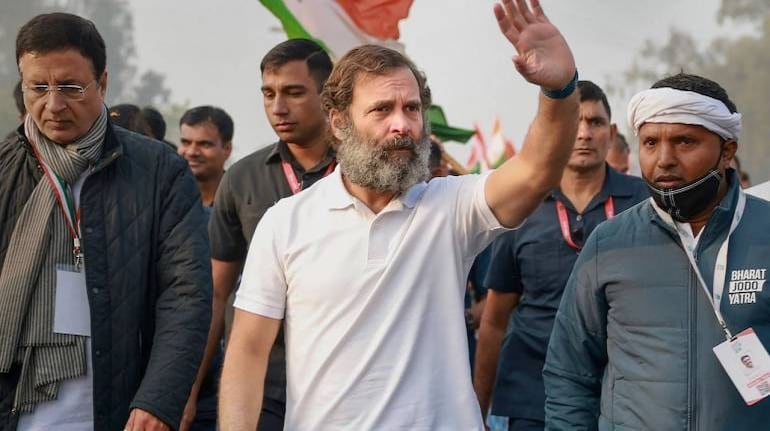



"In war you can only be killed once, but in politics many times" - Winston Churchill.
If anyone fits the above aphorism perfectly, it is the former Congress President Rahul Gandhi. I first met Rahul even before he had won his first parliamentary election from the family bastion of Amethi in Uttar Pradesh. It was late February 2004, and if opinion polls were truly prophetic, India’s once default political operating system would face its third successive general election defeat to the Atal Bihari Vajpayee-led National Democratic Alliance (NDA) within a short span of six years.
An apocalypse beckoned. Clad in a light beige cotton trouser and a white tee-shirt, a smiling Rahul introduced himself, slightly awkwardly, but palpably aware of the treacherous battlefield ahead. Despite a family history of brutal assassinations of his grandmother and father, which can create damaging, permanent scars in one’s head, Rahul was bravely crossing the Rubicon.
Not easy. Not easy at all. Further, he was voluntarily participating in an electoral battle when the Congress party was facing hurricane-like headwinds. Rahul was pushing the envelope, getting outside of his comfort zone. I have always felt that he has never been credited enough for that early fiery baptism.
No Longer Just A Dynast
But looking at him speaking through the falling snow in Srinagar, a picture of resoluteness and conviction of a man on a mission, I knew that he was probably coming to terms with India’s eerily transformed existential truism. And his own.
Rahul was holding national center-stage attention on his own footing at last and not because he was just another silver-spooned, entitled dynast of the Gandhi family. His speech was impassioned, honest, sans the jingoistic rodomontade we are used to these days. He made a constructive call for rebuilding India through a secular transfusion in its bloodstream.
The Bharat Jodo Yatra, Congress's Kanyakumari-to-Kashmir long march which commenced in Kanyakumari on September 7, 2022, concluded on January 30, 2023 in Srinagar. It crossed 75 districts across 12 states and two Union territories. It appears to have been transformational.
Can Rahul Sway Potential Allies?
Will a resuscitated Rahul Gandhi political brand (and by natural extension, a charged up Congress cadre ) herald a pharaonic shift in Indian politics? Or will it end up being like a bedazzling first half to a disappointing climax in a Bollywood potboiler? That is the proverbial billion-dollar question.
With the recent renaissance of the Congress giving the party a new lifeline, it is imperative that Rahul Gandhi takes pole position in the leadership of the opposition coalition arrangements. This is easier said than done. Regional satraps are seeing an emerging vacuum and have also renamed themselves in a pan-India pitch (Telangana Rashtra Samithi of K Chandrashekar Rao is now called Bharat Rashtra Samithi). Mamata Banerjee’s TMC is planning a similar repositioning. Akhilesh Yadav correctly believes that in Uttar Pradesh, Samajwadi Party is the last man standing to stop the BJP’s take-no-prisoners domination.
Instead of adopting a confrontationist attitude towards their New Delhi ambitions, the Congress needs to create a collaborative, trustworthy and strategic coalition to handle these restless leaders looking for pan-India spotlight. This will require excellent zero-egocentric interlocutors, savvy number-crunchers and skillful negotiators, all rolled into one. In my experience, politicians will do anything to win. The problem is that they also possess Himalayan egos.
Sometimes, ridiculous as it may sound, but they are willing to cut their nose to spite their own face, if they feel chagrined. If the give and take between the Congress/UPA and UPA plus partners (mostly concentrating on winnable Lok Sabha seats and the distribution between assembly/general election stakes) works, the BJP will face an uphill if not an insurmountable task (the BJP has no regional alliance partner left, other than AIADMK, thanks to their political superciliousness and insatiable appetite to swallow their own compatriots).
Rebuilding The Congress
The Congress needs to immediately stop organisational leakage of talent; the BJP has ruthlessly exploited the grand old party’s lackadaisical, almost counterintuitive approach here. I remember as the party’s spokesperson, I repeatedly hammered away at the woeful talent-deficit in the BJP. In a country where political opportunism overwhelms ideological fidelity, one needs alert gatekeepers.
Without good people, a political party is like a book without words. Organisational reforms that encourage meritocracy and a 24x7 grassroots mobilisation of supporters (the Haath Se Haath Jodo campaign is a step in the right direction) at the booth level could make the Congress revert to its erstwhile dynamism.
As the spectacular global headline-making Adani Group meltdown has exemplified, a week is enough to upend even the most serene status quo in politics. Anything can happen. As the chinks in the armour of PM Narendra Modi begin to balloon into public consciousness, new pathways begin to open. After walking 4,000 kilometres, Rahul Gandhi should know what they are.
Sanjay Jha is a former national spokesperson of the Congress, and author of The Great Unravelling: India After 2014. Views are personal and do not represent the stand of this publication.
Discover the latest Business News, Sensex, and Nifty updates. Obtain Personal Finance insights, tax queries, and expert opinions on Moneycontrol or download the Moneycontrol App to stay updated!